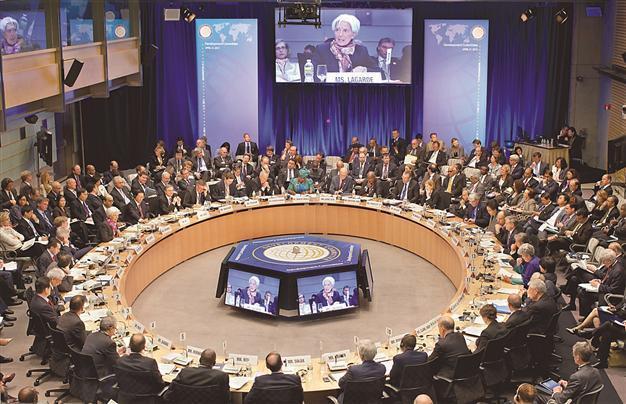IMF urged not to throw more money to Europeans
WASHINGTON- Agence France-Presse

In this IMF handout photo shows IMF Managing Director Christine Lagarde speaks at the Development Committee April 21 at the World Bank in Washington, DC. ‘It is nice to have a big umbrella,’ Lagarde says. AFP photo
The International Monetary Fund has wrapped up meetings here with its coffers to fight the eurozone crisis $430 billion richer. But it also collected a message from the emerging economies that contributed that it should not easily throw more money into Europe, and that they want more say in how the IMF is run.There was some clear relief in the air after the IMF and Group of 20 major economies came out of their meetings on April 20 with commitments from the leading emerging economies Brazil, Russia, India and China to contribute to the fund’s “global firewall.” With worries now that Spain and Italy are on the verge of needing rescues, the funding boost is aimed at preventing new financial crises from ripping through global markets.
“It is nice to have a big umbrella, or a big firewall... and that was really the achievement” of the IMF-G-20 meeting, IMF Managing Director Christine Lagarde said on April 21. The IMF had already cut its goal for the firewall funding from $500 billion to $400 billion, with its major shareholder the United States declining to contribute and the emerging giants, known as the BRICS, clearly nervous that their contributions might end up in a European black hole.
Donations piling up
Earlier, eurozone countries pledged to contribute with $200 billion and Japan $60 billion. But it was only at the financial summit that the IMF was able to pull in the balance.
Britain, South Korea and Saudi Arabia each pledged $15 billion; smaller amounts came from other European governments, and then, finally, the BRICS and three Southeast Asian countries promised a collective $68 billion, though no specific amounts were given.
The amount doubled the IMF’s resources for intervening in crises, and together with the eurozone’s own recently assembled $1 trillion firewall, was close to what IMF analysts say is necessary to prevent financial contagion that spill from Europe.
“... IMF resources had been taking up a lot of time, and I think it was about time that that conclusion was taken here,” said Danish Finance Minister Margrethe Vestager.
But the money came with warnings from IMF members not part of the US-Europe-Japan axis that dominates the Washington-based global lender. First, they worried that after committing some $130 billion already to rescues of Greece, Portugal and Ireland, the IMF board would too easily give in to another bailout of a foundering eurozone economy.
Argentine Economy Minister Hernan Lorenzino, who represents several Latin American countries at the IMF, echoed that. “During this process, many rules of the Fund had been changed to accommodate the support to the most-needed countries in Europe in a way that was not seen at the time of the Asian crisis in 1997 or the Latin American crisis in the 2000s.” Lagarde though insisted nothing had changed in the IMF approach. “What has been clearly reminded through the course of the discussion is that, number one, that those bilateral loans... do not form a special pot of funds or coffers that have an EU label on it. It is for all members of the IMF.” Secondly, she said, it must be used under the strict, exact, even-handed, non-discriminatory.
















